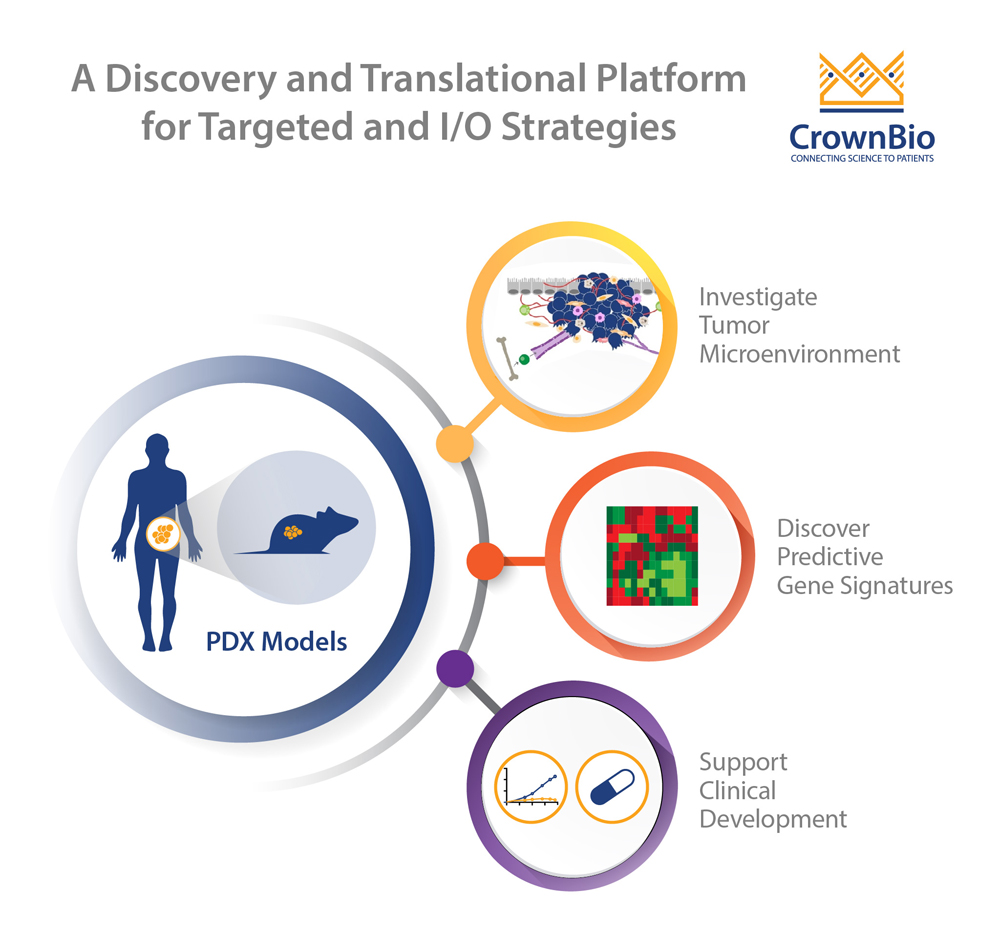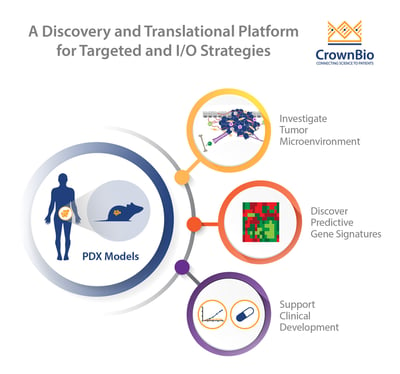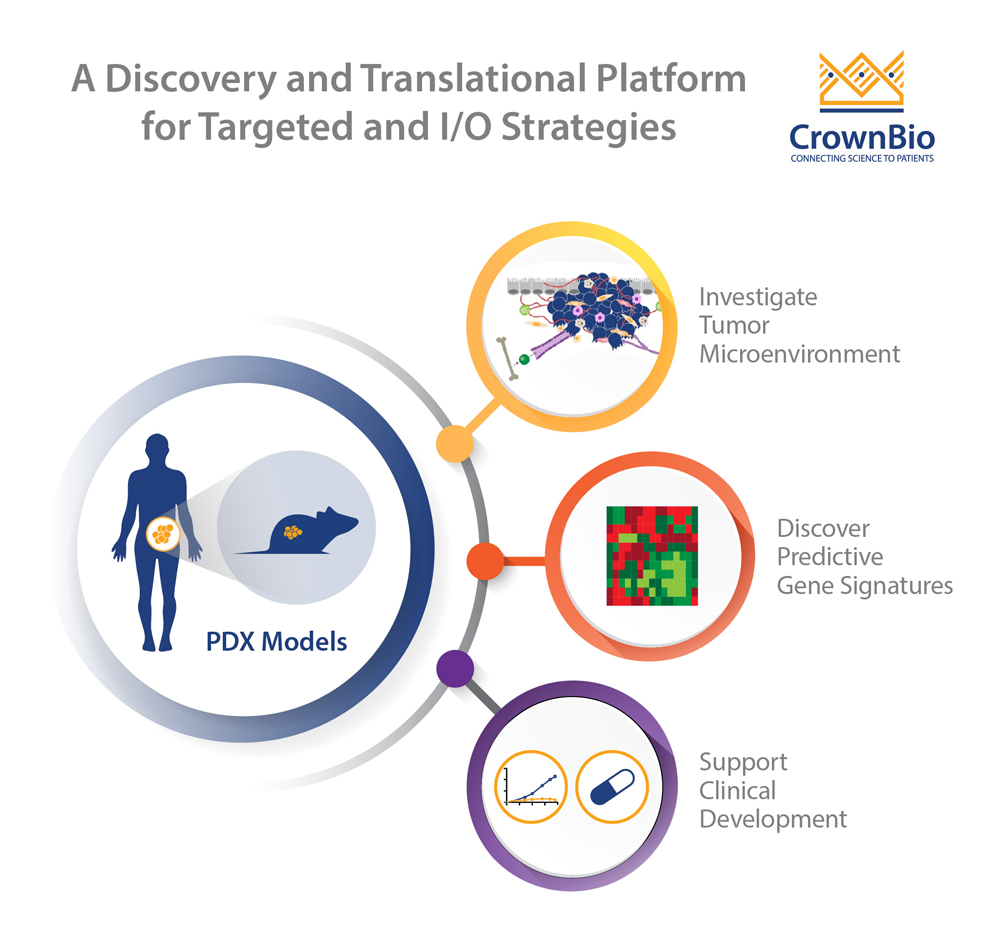Novel Uses for PDX Models in Preclinical Drug Development

 Learn how unique PDX models are used to support clinical drug development, discover predictive gene signatures, and for tumor microenvironment investigations.
Learn how unique PDX models are used to support clinical drug development, discover predictive gene signatures, and for tumor microenvironment investigations.
Patient-Derived Xenograft Models
Patient-derived xenograft (PDX) models are a commonly-used tool across oncology drug development. It’s well-known that PDX offer a more translational xenograft model, for predictive preclinical studies.
For the full potential of PDX models to be fulfilled, researchers need to optimize their use in both hypothesis testing (e.g. assessing specific targeted therapies) and hypothesis generation (e.g. predictive biomarker discovery).
In this post, we’re taking a look at specific cases where unique PDX models have helped in supporting clinical development, discovering gene signatures, and for investigations into the tumor microenvironment (TME).
PDX as Human Disease-Relevant Drug Development Tools
PDX are highly useful in hypothesis testing and supporting clinical development due to their recapitulation of human disease. Human tumors harbor many distinct genetic features, including gene mutations and fusions. Successfully targeting these genetic events is a key part of personalized medicine.
To develop a targeted agent against a specific mutation or fusion you need to be able to test for efficacy. This means you need a clinically relevant model containing the genetic event. Conventional xenografts are not available for every needed mutation/fusion, and can drift from human disease over many years in passage.
The benefit of PDX, derived directly from human disease, is that clinical tumors are more closely recapitulated, and more human relevant genetic events are captured across large PDX collections. Models of choice can then be used to test up and coming targeted agents, helping to collect the data needed to move to clinical trials and eventual approval.
PDX Models in IDH2 Inhibitor Development
A great example of PDX models aiding clinical development is IDH2 inhibitors in acute myeloid leukemia (AML). Point mutations in the active site of IDH1 and IDH2 are found in a variety of cancers, including AML. These mutations contribute to leukemia development by blocking hematopoietic cell differentiation.
Specifically, IDH2 mutations are seen in just over 9% of AML cases, with 75% of these mutations being the IDH2 R140Q variant. This provided a specific target for the development of potential new AML therapies. Following a high-throughput screen for inhibitors of the IDH2 R140Q variant, AG-221, an oral, selective, first-in-class inhibitor of the mutant IDH2 enzyme was developed by Agios Pharmaceuticals.
Following confirmation of the excellent pharmaceutical properties of this compound, activity was tested. This included using an aggressive PDX AML model harboring IDH2R140Q to test survival benefit. Compared with both vehicle and Ara-C standard of care, AG-221 treatment resulted in a statistically significant survival advantage, as well as tumor differentiation (with a dose-dependent decrease in the percentage of BM blast cells observed, and an increase in expression of CD15).
These data supported initiation of clinical trials with AG-221, which was later FDA approved for the treatment of adult patients with relapsed or refractory AML with an IDH2 mutation.
Gene Signature Discovery with PDX
PDX models also can be used in large cohorts in population studies called Mouse Clinical Trials (MCTs). Within these studies, each PDX acts as a patient avatar, and the whole cohort of avatars reflects a diversity of the human clinical population.
MCTs have many uses, including identifying drug responders/non-responders, repositioning agents, and in the discovery or validation of genetic signatures of response, which can be tested in clinical trials. A good gene signature case study involved using a PDX model Mouse Clinical Trial to predict response to cetuximab across a range of cancer types.
Predicting to Response to Cetuximab Across Colon, Gastric, and Lung Cancer
EGFR aberrations are implicated in oncogenesis across a variety of carcinomas such as NSCLC, CRC, gastric, bladder, and breast cancer. Targeting EGFR and EGFR pathways with agents such as cetuximab, has however proved tricky. For example, in NSCLC and CRC, increased EGFR expression is associated with advanced disease and unfavorable prognosis. However, CRC response to cetuximab doesn’t actually seem to correlate with EGFR expression.
This is in opposition to gastric cancer, where drug efficacy positively correlates with EGFR expression levels. This means that cetuximab response may involve different biological pathways in different indications. Developing a gene signature of response could help to predict which cancer types would respond to treatment.
To investigate such a signature, an MCT used large cohorts of PDX derived from patients with NSCLC, CRC, and gastro-esophageal carcinoma. The models were treated with cetuximab and response analysed.
Significant interactions were found between tumor growth rate and EGFR expression levels for both gastric cancer and NSCLC, but these interactions were not observed for CRC. Machine learning was then applied to identify potential biomarkers for cetuximab treatment, at both gene and pathway levels.
Multigene signatures with a high predictive power were identified from the MCT, to predict response to cetuximab in gastric, lung, and colon cancer.
PDX for Investigating the Tumor Microenvironment
PDX models are also helping to study the tumor microenvironment (TME). The TME is increasing in importance as we understand more about cancers being immunological abnormalities, as well as genetic diseases. The TME plays a critical role in tumor progression and response, and research is moving towards studying immunogenomics alongside cancer genomics.
This means we need to improve our understanding of the TME and stroma-specific components. Historically this has been challenging, but this is changing with newer experimental models like PDX. Human and murine TME components can be efficiently separated in PDX models, along with the loss of most of the human TME, enabling downstream investigation into the relationship between tumor cells and tumor stromal components.
PDX as a Surrogate Model for TME and Tumor-Stroma Interaction Studies
Whole transcriptome sequencing of large PDX panels has started to answer some questions on the TME. Cross-species interactions between human tumor cells and murine stroma have been established. These differ by type, and/or degrees of interaction, across different cancers implicating relevant heterogeneous biological processes essential for tumor growth.
The tumor-TME interactions most likely to be associated with tumor growth have been identified, with their numbers reversely correlated to transplantation take-rate and negatively correlated to the presence of KRAS mutations.
Active, murine tumor-infiltrating immune cells have been identified within the tumors, specifically B cells, dendritic cells, and NK cells, and human stroma was also found, dependent on cancer type.
Summary
PDX models offer a predictive model platform for preclinical studies. With a wide variety of uses, they can be implemented as a key discovery and translational platform for targeted and immuno-oncology studies.


